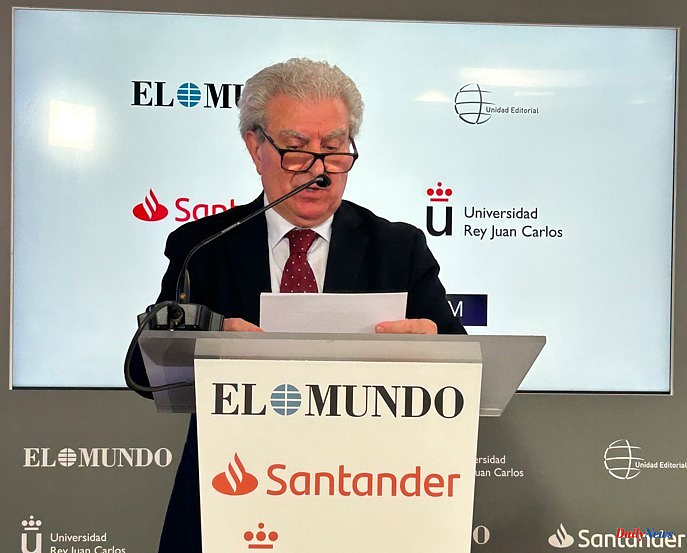"What can be expected from an educational system in which students end their courses by failing and going on to the next? What can be expected when they finish high school without knowing which country they belong to, Catalonia, the Basque Country, Galicia?" . This is how forceful César Antonio de Molina closed the meeting Good education in Spain. Proposals and opportunities, organized by EL MUNDO in collaboration with Santander and the Rey Juan Carlos University. A broadside of special substance in the words of the former Minister of Culture of a socialist government, between 2007 and 2009, and with even louder echoes after learning of the ruling of the Constitutional Court that, rejecting an appeal by Vox, has framed the Celaá law within the "broad margin" that the Constitution provides the legislator to design an educational model in accordance with his "ideological conception".
Molina excused educators and students. The culprits are, he says, "the politicians who care more about the ideals of their parties than those of the State." He also warned that in our country "we live in the midst of a language war and this education law does nothing to prevent it", and he did not hesitate to describe the case of Catalonia as "the best example of xenophobia and linguistic racism, very similar to , the other way around, than in Franco's times". He added a charge of depth to whom it may concern: "Does a new education law make sense when some of the highest levels have not fulfilled their own academic duties? Will it be in this new plan to explain what is the truth and how it should be respected in a rule of law where we are all equal, whatever we think?"
The former minister of the Government of Rodríguez Zapatero concluded by citing French President Emmanuel Macron, who in a recent interview said that "national education must reconnect with the ambition of being one of the best in Europe." Molina emphasized "ambition" emphatically and wondered if "someone, ever in Spain, has uttered this word. The requirement for students of the Celaá Law is on the ground."
Before this powerful closure, a large group of experts had analyzed the current state of education in our country. The meeting was opened by Rosa Visiedo, vice president of the CRUE and rector of the CEU, who refuted the recurring disqualification of the Spanish university as a "factory for the unemployed" with data from the INE: "The unemployment rate among those who only have a basic level of education is around 30%, while among university students it drops to 10%". However, she recognized "that greater adjustments between the teaching supply and the demands of the labor market are necessary." In this context, she said, "CRUE is participating in all national and international initiatives to promote continuing education."
The present and future of education round table discussed the need for a cohesive, equitable, and quality school, with strengthened teachers and provided with the necessary resources, in addition to the need for university reform. Julio Iglesias de Usell, Professor of Sociology at the Complutense University and former Secretary of State for Education and Universities; Montserrat Gomendio, former OECD Deputy Director of Education, former Secretary of State for Education and member of the Board of the International Baccalaureate; Mariano Fernández Enguita, sociologist and former director of the National Institute of Public Administration, and Adolfo de Azcárraga, emeritus professor of Theoretical Physics and co-author of the report "Miras para reformar la universidad".
The recent law of the University System, the LOSU, was the great protagonist in this debate. Iglesias de Usell used irony to define it as "an extraordinary law... from the 19th century. I don't know why they did it, apart from paralyzing the entire university system." Gomendio, for his part, criticized the changes to the LOMLOE for negatively affecting "equity and quality" of teaching on issues such as "the right of choice of parents in the concerted one", "the redesign of evaluations", the "increasing differences between autonomous communities" or the "great jibarization of curricular content".
Asked about the possibilities of creating a solid evaluation system to measure the quality and effectiveness of the educational system, Enguita was skeptical: "It is not a national tradition, but, in addition, there are deeper problems: we have an educational system inherited from a time that doesn't exist. With military service gone, we're the last conscription-based institution, with a captive customer and escalating costs." De Azcárraga was even more caustic, maintaining that the legislation, "being completely ideologized from a notion that has nothing to do with the natural reality of people, is doomed to failure."
At the table What university demands a world in change? Antonio de Castro, Vice Chancellor for Ordination at IE University; Joan Rodón, Dean of Esade Business School, and Andrés Martínez, Vice-Rector for Quality and Strategy at the Rey Juan Carlos University.
De Castro emphasized the difficulties that the Spanish educational system poses "to the access of foreign students and the admission of foreign professors." Rodón qualified that "internationalization does not only consist of attracting students" and, "although obviously there are purely administrative and regulatory tasks that do not help, universities also have to develop a series of capacities and competences for which not all are prepared". Martínez, for his part, stressed that, beyond internationalization, our university suffers from a problem with "the relationship between the public and the private: the intersection between the company and the university is still very low in Spain."
According to the criteria of The Trust Project












